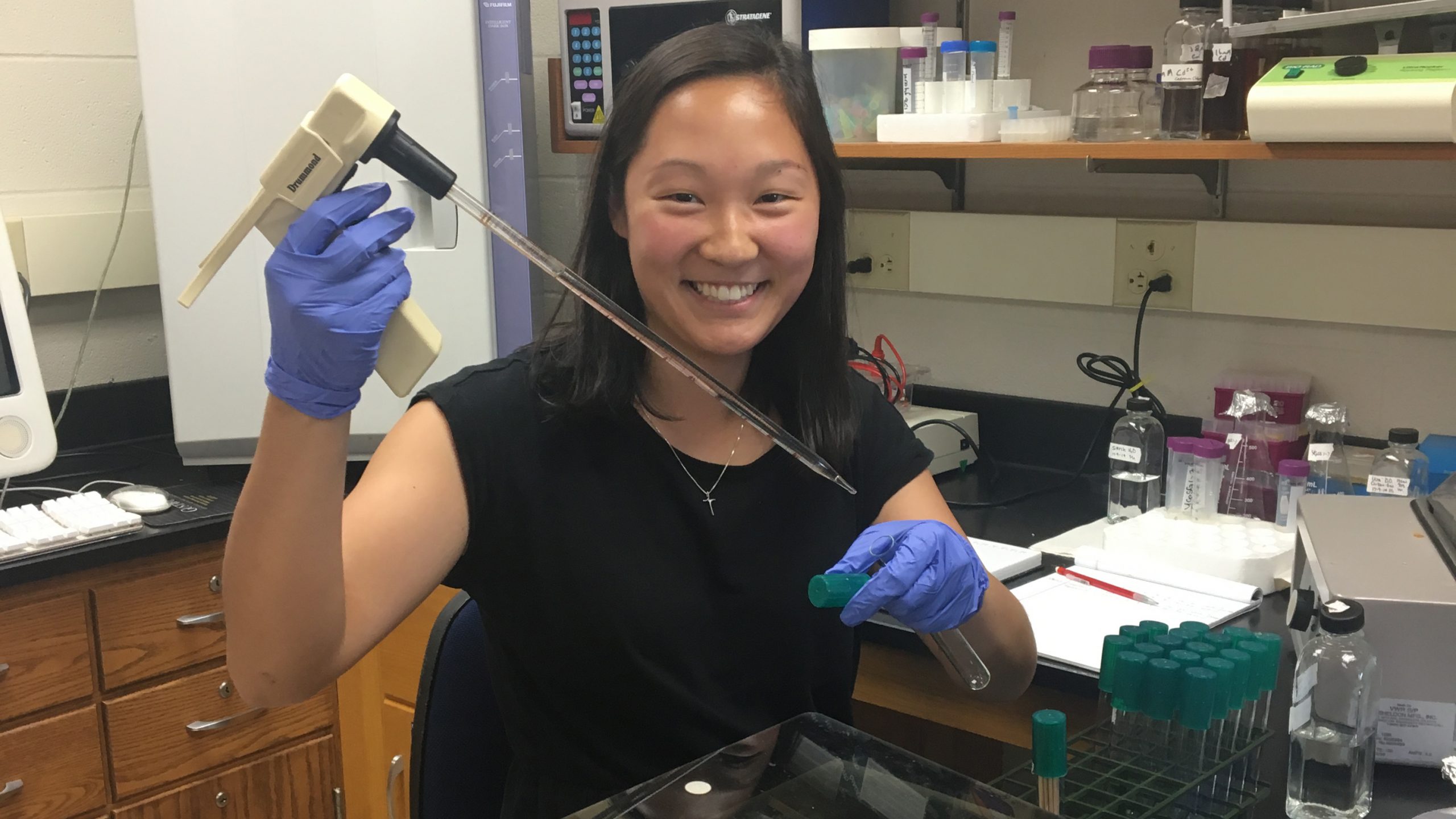Gustavus Adolphus College senior Sara Graves is back on campus for a few months this fall in between her summer research position at the Mayo Clinic School of Medicine and the Mayo Graduate Research Employment Program (GREP), which she’ll begin after graduation.
The Faribault, Minn. native’s success in the research field follows a unique path.
Taking advantage of Gustavus’ Post-Secondary Enrollment Option (PSEO) program, Graves applied to college during her junior year of high school, a year before her peers. Moving to campus the next fall, she spent her senior year of high school as a typical first-year student on the Hill, taking classes, eating in the Caf, and doing her own laundry. At the beginning, staying at Gustavus for her entire college career was not a part of the plan, so she began applying to other schools. But her search didn’t last long.
“I just decided that I liked it here too much to leave. I kind of fell in love and didn’t move out, and that was that,” Graves laughed.

During her first year, Graves became a member of the Newman Center, a Catholic student organization on campus. The following year, she joined the Gustavus Wind Orchestra and began touring with the close-knit group of musicians. Now, she serves as the president of the Newman Center and remains an integral part of the wind orchestra after three cross-country tours and countless hours of rehearsal.
Inside the classroom, it did not take long for Graves to find her place in the biology department. She planned to become a doctor and declared a biochemistry major in hopes of pursuing a pre-med track. A couple semesters later, she accepted a summer position in a research lab at the University of Michigan in 2016. There, Graves assisted in a neuroscience pharmacology lab, helping a team study an isolated gene connected to bipolar disorder. The lab’s stipend made her travel possible, and she entered the research lab hoping for more experience in both the biology and medical fields. Back at Gustavus, she decided to pursue additional research opportunities. She joined biology professor Jeff Dahlseid’s lab and assisted in investigations focused on cell protein levels during a January Interim Experience research course that extended through the spring semester. She excelled and it was not long before she realized that her path had shifted again.
“They have this saying about being bit by the research bug, and when it happens, it really happens. I don’t think I entirely understood or appreciated science fully until I began conducting research. Then, it hit me. We can use science to better the world and help people,” said Graves.
“The key elements to Sara’s success as a student are her positive attitude, excellent time management, diligence and, perhaps most importantly, her curiosity, which she lets herself enjoy,” Dahlseid said. “Frankly, I’m jealous of her organizational skills. She’s a supremely good planner. But this is not to imply that Sara is all work and no play…she has balance. Using her skills, she makes time for a lot of different things, her academics, music, laboratory research, relationships. I don’t think there is anything that she is doing that she doesn’t enjoy.”
Pursuing her new interest, she applied to various research programs across the state. Identified as a strong student, she was offered the Summer Undergraduate Research Fellowship at Mayo. As an assistant in Dr. Madhu Grover’s gastrointestinal lab, Graves spent the summer studying irritable bowel syndrome and its connection to food poisoning.
“It was different than anything I had done before, so it was very interesting. I was tasked with searching for markers in people with food poisoning that later developed post-infection irritable bowel syndrome. Clinically, this will hopefully lead to the identification of specific determinants that can be used as therapeutic targets in order to decrease the instances of PI-IBS,” Graves said. “I learned a lot. I learned that I love lab independence and being able to have responsibility for my lab work.”
Her time at Mayo not only reaffirmed her passion for research, but it also introduced her to the graduate programs available at the school. At the completion of her GREP position this spring, Graves will begin her graduate studies program in pursuit of a doctorate in biology. The comprehensive program may take five to seven years to complete.
For Graves, this just means more opportunities to be in the lab.
“I feel very lucky because I found out what I am good at and what I really enjoy early on. I really hope everyone gets to feel that was about something,” Graves said.
To learn more about research opportunities at Gustavus, visit the undergraduate research website.

Leave a Reply
You must be logged in to post a comment.